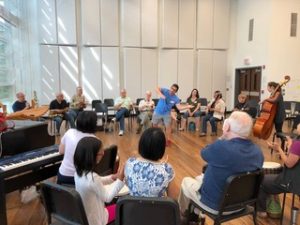Tim Simmons (Graduate 2013) was, as he says, a “drummer’s drummer.” He grew up in Philly, taught himself to play by playing in bands, gigging all through high school. Like many band drummers he didn’t read music and had no musical education other than what he learned in the bands.
Over the years he started teaching on the side, facilitating drum circles and percussion ensembles.
With an undergraduate degree in English, Tim started out teaching in inner city schools. When he interviewed for the Delaware Valley Friends School, it was for an English position and it was the day after his second daughter was born. He may have been a bit distracted.
From English Teacher to Music Teacher
During the interview for the English position, the head of the school said they were also interested in the ‘drumming stuff’ that he had put on his résumé “as a lark” and, she said, “Maybe you could do something with drums.” There was an intention at the time to develop a full music program at the school. He got the job.
DVFS is a national leader in educating students with learning differences in grades 3-12. As drumming helps with language development, it would be a natural fit. He took the job, starting out teaching English, and when the itinerant Music Teacher left, he was asked to jump in. But Tim knew nothing about teaching music or learning differences. The learning at the school is student-focused and student-led. Tim’s approach was “I don’t know anything about teaching music and you don’t have much experience—let’s do this together.”
Fortunately, the head of the school was also keenly interested in bringing in resources. She invited Mary Knysh to the school to do a workshop for the kids. “When Mary came, she got the kids to play this music… and since I knew the kids, I knew they didn’t know anything more about music than I did. It seemed like some sort of magic trick she pulled.”
 Mary invited Tim to the next Music for People weekend workshop. After the introductory session with the new people, where some of the MfP fundamentals were introduced, the group headed downstairs to join the larger group, already in session, in quartets. Tim sat down in a quartet. The guy beside him turned to him and said, “Hey man, I’m David.” After that session Tim wondered, “What’s happening? Who IS this guy?” It was, of course, David Darling. He was blown away by the accessibility and the high level of musicianship.
Mary invited Tim to the next Music for People weekend workshop. After the introductory session with the new people, where some of the MfP fundamentals were introduced, the group headed downstairs to join the larger group, already in session, in quartets. Tim sat down in a quartet. The guy beside him turned to him and said, “Hey man, I’m David.” After that session Tim wondered, “What’s happening? Who IS this guy?” It was, of course, David Darling. He was blown away by the accessibility and the high level of musicianship.
Joining the Musicianship and Leadership Program
That was in 2008 or 2009. Tim signed up for the Musicianship and Leadership Program. The program “opened up this wellspring of music. It had been there all along, but I didn’t know how to access it. The Homeplays especially were helpful. They were so systematic and rigorous.”
Julie Weber was his mentor. She pushed him to play the piano, taking a lot of time him with at the weekends to explain the music behind the music and having him play with a pencil in each hand. “By the end (of the MLP) I had become this musician.”
Tim had always dreamed of playing other instruments. He says that as a drummer, you’re stuck playing what other people want you to play. But at Music for People….
“Everyone just picks up instruments and starts playing! The whole idea that you can just play anything! There are some serious musicians there! I started buying other instruments. It drove my family crazy!”
On his own, he studied theory and learned to read music. He went on to get a Master’s in Music Education, creating a curriculum for children with learning disabilities for his thesis. His research focused on how we process and hear language. The curriculum is structured so that it follows the story of a young girl who recovers from trauma by learning about music from the natural world.
Tim’s Favorite Technique: One Quality Sound
“This is essential to what I teach. The kids tease me because I use it so often. You don’t understand it when you first hear it. Its meaning changes as you use and hear it. One Quality Sound means something different to each kid. It helps them make music together. Some of the kids come with a lot of musical experience. Others come with nothing. One Quality Sound brings experienced and non-experienced musicians together.”


